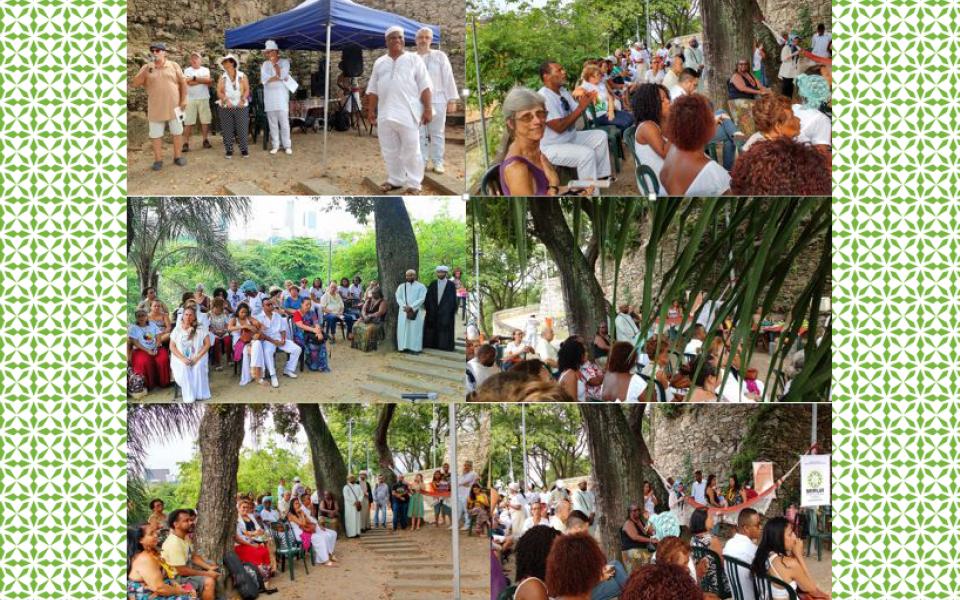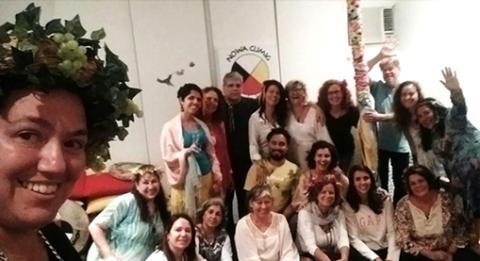
Rio Inter-Religious Movement CC (MIR) celebrates WIHW 2018
Thanks to Law No. 11,635, January 21 is the National Day to Combat Religious Intolerance in Brazil. For this reason, we started our celebration of the World Interfaith Harmony Week on this day. The date was chosen because it was also the death day of Ialorixá Mother Gilda, of the Terreiro (African Brazilian Religious Temple) Axé Abassá de Ogum (Bahia), who suffered a heart attack after being attacked in newspapers of the Universal Church of the Kingdom of God, accused of charlatanism, witchcraft and black magic. Her accusation was a clear act of religious intolerance, motivated only by the fact that Ialorixá was practicing a religion of African origin. A homage was made to Mother Gilda, where our gratitude and respect was shown.
The patron saint of the city of Rio de Janeiro, St. Sebastian, died anguished for preserving his faith.
Koinonia, Ecumenical Presence and Service (a Brazilian ecumenical organization) has celebrated this date since 2012. In 2018, this year, it highlighted the exhibition “Intolerance has a Face, Name, Color and Address.” There were 12 banners showing quotes from the Dalai Lama and Gandhi, highlighting the importance of continuing the process of raising awareness in humans, and that we all have the right to practice our faith.
We enjoyed the participation of many religious leaders and institutions: Bhaktivedanta, Baha'i, Buddhist, Catholic, Gypsies, Spiritualists, Daimists, Spiritists, Evangelicals, Great White Brotherhood, Hare Krishnas, Indigenous, Jews, Muslims, Native Americans, Native Traditions, Umbandists, and Wiccans. Institutions: B'nai B'brith, FIERJ, KOINONIA, MIURA, MUDA, OCA, and URI. Artists that donated their work to the show: Ogan Genário e Zoatabaque, Respeitem Meu Canto, Ás de Ouro, Cocada Carioca, Vacite and Encanto Cigano.
After the reopening of the Outeiro da Glória Municipal Monumental Park, it has been awarded the status of a Sacred Site, where all religious traditions can perform ceremonies, artistic and cultural activities. In the opening ceremony, we had around 500 people and a lot of publicity about the event. We were able to accomplish everything despite scarce financial resources and infrastructure. But we occupied the park and spent the days in its gardens, where we talked, we sang, and we exchanged experiences.
We are convinced that it is not enough to fight intolerance. It takes the military also being in favor of religious freedom. Even those who have no faith must be free to follow their path. The state is and must continue to be a layperson, and each individual should have the right to choose his own path of connection with the divine, of earthly devotion, of agnosticism or of abstention from the religious question.
The ceremonies in the Outeiro da Glória Monumental Municipal Park were simple, harmonious and beautiful. The purpose of working through interreligious dialogue was to work together among people of different traditions, the characteristic of the religious matrix in Brazil. See more on the Facebook page.
See more URI World Interfaith Harmony Week 2018 celebrations here.

